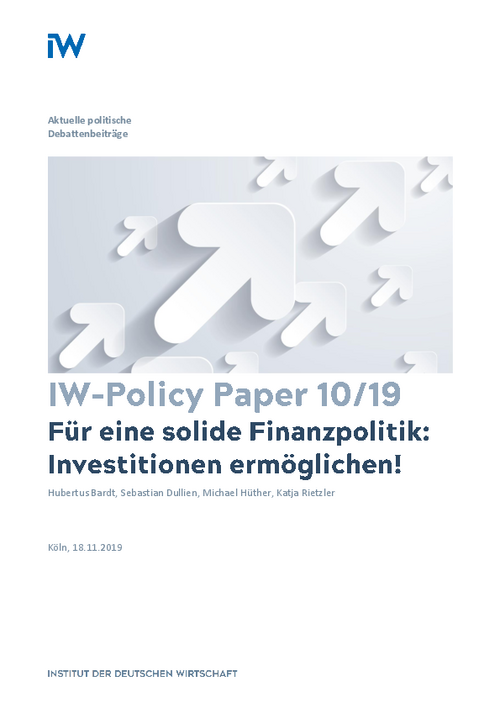Germany faces enormous challenges in modernizing its capital stock. After neglecting public investment over the last two decades, it is now necessary to update the infrastructure and gradually reduce the investment backlog.

For a sound fiscal policy: Make investments possible!
IW-Policy Paper

Germany faces enormous challenges in modernizing its capital stock. After neglecting public investment over the last two decades, it is now necessary to update the infrastructure and gradually reduce the investment backlog.
Managing demographic ageing and decarbonising the economy will also require major efforts in the coming years. The infrastructure needs both to be adapted to a post-fossil age and to meet the requirements of an ageing population. The education system also needs investment to deliver significantly better results in the future. New concepts must be developed in order to ensure prosperity in this country. The state plays a key role in all these tasks. It can indirectly stimulate private investment with its own investments, and it can provide favorable conditions and appropriate support measures for private investors.
Unfortunately, the German state has not carried out these tasks sufficiently since the early 2000s. Most recently, there has been some trend reversal in public investment, but previous increases of public investment have been too tentative, and implementation is not progressing fast enough. Overall, Germany is increasingly putting its own economic future and thus the prosperity of future generations at risk.
There is a considerable need for investment which adds up to at least €450 billion in the next ten years. In order to finance this volume of public investment, it is important to remove obstacles in the political decision-making processes and in financial relations between public subsectors. However, these reforms should not question the financial soundness of the state. The state should and can fulfil its central mandate to invest in the public capital stock and to stimulate private investments in a fiscally, economically and environmentally sustainable manner. A path is presented here that is constitutional and addresses both the temporal and financial dimensions.

Hubertus Bardt / Sebastian Dullien / Michael Hüther / Katja Rietzler: Für eine solide Finanzpolitik – Investitionen ermöglichen!
IW-Policy Paper

More on the topic
China’s Trade Surplus – Implications for the World and for Europe
China’s merchandise trade surplus has reached an all-time high and is likely to rise further. A key driver appears to be a policy push to further bolster Chinese domestic manufacturing production, implying the danger of significant overcapacities.
IW
What if Trump is re-elected?
A possible re-election of Donald Trump as US president in November 2024 could entail a significant upheaval for the world trading order, if he fulfills his announcements to raise tariffs, mainly in order to reduce the US trade deficit.
IW